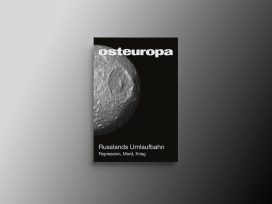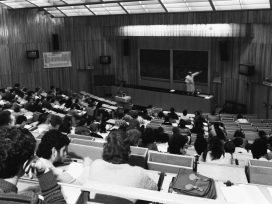Patterns of illiberalism in central Europe
A conversation with Anton Shekhovtsov
Poland’s turn to the right has refocused attention on the roots of the region’s illiberal democracies. Anton Shekhovtsov considers the implications of these developments for Europe as a whole.
Slawomir Sierakowski: Your report about the rise of illiberal democracies for Legatum Institute was commissioned six months ago. So before the latest illiberal changes in Poland began. What was the motivation for the commission at the time?
Anton Shekhovtsov: There were two major motivations behind the report that reflected two different perspectives: one is an internal perspective of the central European region, the other – an international perspective. The first perspective was underpinned by concern over the disturbing condition of liberal democracy in Hungary and non-reformist policies in countries such as the Czech Republic and Slovakia, as well as the proliferation and mainstreamization of ultranationalist and often anti-western narratives in the media sphere of these three countries.
The second perspective relates to a discussion of whether western-style liberal democracy can take root in central and eastern Europe, after decades of authoritarian socialist rule. With the success of democratic transition in Hungary and the Czech Republic in the 1990s, this discussion seemed redundant, but more recent developments have reinvigorated the discussion and put the region in the spotlight. Could it be that liberal democracy was incompatible with the political culture of central and east European societies? A positive answer to this question would cast doubt on the potential for democratization in the region and far beyond.
SS: What do the countries that you describe have in common, concerning the pressure put on the courts, including the Constitutional Court?
AS: In any parliamentary democracy, the institute of Constitutional Court is the only counterweight to the parliamentary majority. In the more problematic cases in the region – Hungary and now Poland – we see that illiberalism manifests itself first and foremost through changing the Constitution in an illiberal way. Since the Constitutional Court has the ultimate power to reject amendments to the Constitution, illiberal forces strive to control Constitutional Courts. Between 2011 and 2014, Hungary’s prime minister Viktor Orbán and his ruling party Fidesz managed to turn the Constitutional Court into a loyal body. Eleven of the 15 judges were appointed by Fidesz and its minor coalition partner without any consultation with the opposition.
SS: And what do they have in common when it comes to the pressure put on media? How do politicians try to influence public and private media?
AS: There are different methods of putting pressure on the media in the region, ranging from mild to grave. In Slovakia, we see that prime minister Robert Fico would refuse to answer questions at press conferences and other events from media that he does not see as friendly. Fico’s government also seems to have imposed an informal ban on communication with the independent media by treating requests from journalists as requests from ordinary citizens, who, according to the Freedom of Information Act, do not get priority and can acquire information only after long delays.
In Romania, most of the media resources belong to oligarchs who use them as their political weapons. In the Czech Republic, we can observe a “Berlusconization” trend: finance minister Andrej Babis, a popular politician and the second richest person in the country, now owns a notable share of the media resources, which, of course, cannot be free from political pressure of their owner.
In Hungary, the newly established Media Council has the power to fine television and radio stations for allegedly unbalanced coverage – fines against which there is no appeal – and can ban public subsidies of media outlets. Fidesz-dominated parliament has also adopted an amendment that banned political advertisements in commercial media during election campaigns thus damaging their financial stability. The Hungarian government has also stopped placing advertisements in the independent media, while private companies, fearing loss of government contracts, gradually decreased the share of advertisements they placed in the independent media.
SS: What is the role played by these countries’ secret services in illiberal government?
AS: Central European states are heirs to authoritarian socialist systems where the secret services and intelligence agencies played a very important role. Perhaps as a reminder of this heritage, we can observe that in Hungary, Poland and Slovakia, illiberal politicians came to power after so-called “bugging scandals” targeted liberal democratic politicians – operations which had unlikely been possible without the involvement of either domestic or foreign secret services and/or intelligence agencies.
SS: How do these illiberal democracies try to limit the rights of citizens, including with regard to control over the Internet and communications?
AS: Apart from continued discrimination against the Roma population and non-heterosexual people, there have been no significant violations of the rights of citizens in the region. In Hungary, Orbán’s government attempted to introduce taxation of Internet usage, but after mass protests, this amendment to the Taxation Law was dropped.
SS: What else do these governments try to limit, paralyse or eliminate concerning the rules of liberal democracy?
AS: Apart from attacks on the constitutional order and the media, illiberal politicians contribute to the formation of “uncivil society”. Since a strong civil society is one of the major obstacles to establishing or maintaining an illiberal regime, promotion of anti-democratic discourse through various conspiracy theories and ultra-nationalism aims at mainstreaming uncivil society in order to weaken the opponents of the illiberal regime.
SS: In a post-communist Europe ruled by prime minister Viktor Orbán, prime minister Robert Fico, president Milos Zeman and prime minister Jaroslaw Kaczynski, do you have the impression that we are observing a comeback of the anti-liberal political culture from before 1989?
AS: Times have changed, and while illiberal political culture is a characteristic of both the pre-1989 situation in central Europe and specific developments in the region today, I do not think that it is possible for central European states to return to the conditions where any single ideology would guide state policies. Rather, what emerges today is a new phenomenon, which – without imposing any “political religion” on the population – may destroy liberal democracies through, on the one hand, ultranationalist mobilization, the proliferation of conspiracy theories and adopting the primacy of national rights over human rights, and on the other – cynical corruption of political, economic and business spheres.
SS: How strong is the anti-liberal pact between Orbán and Kaczynski in the EU context? What can they achieve together? Can other politicians (Zeman, Fico, and others) join them?
AS: An “anti-liberal pact” would be a frightening development. There are signs that Orbán and Kaczynski are thinking of consolidating their resistance to Brussels. Orbán recently declared that Hungary would veto any Europe-wide response to illiberal policies in Poland. However, according to the provisions of the Treaty on European Union, the European Council can impose sanctions on a member state – for example, suspend the voting rights of a government’s representatives in the Council – with a qualified majority. Hence, Hungary cannot simply veto a decision of a qualified majority in the European Council – it will need many more allies to do this.
SS: How has the position of Poland in international relations changed after the first three months of the new government?
AS: Unfortunately, the image of Poland on the international level has deteriorated over the past three months. Very few leaders expected either the anti-liberal turn taken by Law and Justice or the speed with which the party took this turn. It took several years for Orbán’s Fidesz to do what Poland’s Law and Justice has done in just three months.
SS: Should Vladimir Putin be content with what is going in Poland now or not – or maybe these developments are neutral for Russia?
AS: I think that Putin is celebrating. It is a mistake to think that Law and Justice’s clearly sceptical, if not hostile, attitude towards Moscow is a disadvantage for Putin. Moscow’s goal in relation to the West is not to make the West Russophile; rather, his ultimate goal is to erode western unity, sow dissent among EU member states, pit European nations against each other, subvert integration institutions such as Schengen and discredit NATO. Without the EU and NATO, no individual European nation will have a chance in resisting Putin’s corrupting influences. Therefore, Putin benefits from Law and Justice’s argument with Brussels, and especially Berlin. Moreover, Poland has been and still is one of major defenders of Ukraine’s freedom and sovereignty in the EU. If Poland’s image in the EU is now undermined, then its solid position regarding Russia’s war on Ukraine may be undermined too.
SS: How are the changes in Poland received in Ukraine?
AS: Unfortunately, the majority of Ukrainians are preoccupied with the internal problems, which is understandable of course. However, I wish more Ukrainians paid attention to what is happening in the EU and learned lessons from these developments.
SS: How determined is the EU to put pressure on Warsaw, after mixed experiences of doing so in Austria and Hungary? What would be the EU’s strongest argument? How far will the EU go?
AS: Experience shows that sanctions imposed on European nations can backfire. When the Austrian conservatives formed a governing coalition with the far right Freedom Party, all members of the EU (but not the EU as such) imposed diplomatic sanctions on Austria. They had to drop the sanctions after six months because they led to the rise of eurosceptic attitudes in Austria. If Brussels, which illiberal politicians see as a bureaucratic monster impinging on national sovereignty, applies excessive pressure, it will likely make things worse. I believe that positive action aimed at strengthening the national media and civil society, as well as reducing EU countries’ economic dependence on Russia, would be a better course of action for Brussels.
SS: Some politicians in Poland assume that even if the EU takes a reluctant stance on Poland, the United States and NATO will not necessarily behave in the same way. Are they correct? The important context here is the forthcoming NATO summit in Warsaw in July.
AS: The US remains a strong ally of Poland, and this position will unlikely change any time soon. Especially with president Barack Obama leaving office this year; in view of which, Obama himself is hardly likely to take any strong action. As for NATO, Poland is situated in an area of geostrategic importance – and this is a concern in the face of Russian aggression. I do not think that NATO will risk antagonizing the Polish authorities.
SS: If the EU loses and a new Iron Curtain is raised, then the natural patron for post-communist illiberal democracies in the East seems to be Russia. What’s more, Russia has already exercised significant influence in this region. How strong is this influence?
AS: This scenario is too gloomy: a new Iron Curtain is not possible, because there is no ideology that would support such a prospect. Russia is indeed exerting a strong influence on the region and beyond, and this influence manifests itself primarily through non-transparent business deals. Economic and political corruption is Russia’s main weapon in relation to the EU.
SS: Do European politicians expect Jaroslaw Kaczynski to consider switching his anti-Russian position to a pro-Russian one, like Orbán did?
AS: Orbán’s pro-Russian position is questionable. True, some of his statements can be considered pro-Moscow, and the story about the building of the Paks nuclear plant suggests a shady deal with the Russians. But his “pro-Russianness” seems to be driven by pragmatic considerations, rather than by any ideological affinity or even pro-Russian sympathies. Nevertheless, Hungary has supported all the sanctions against Russia, while Orbán personally favours Ukraine’s rapprochement with the EU. Kaczynski is unlikely to take even a pragmatic pro-Russian position: this would discredit Law and Justice, which presents itself as a major bulwark against Russian influence.
Published 22 February 2016
Original in English
First published by Wirtualna Polska, 9 February 2016 (Polish version); Eurozine (English version)
Contributed by Transit © Slawomir Sierakowski, Anton Shekhovtsov / Eurozine
PDF/PRINTPublished in
In collaboration with
In focal points
Newsletter
Subscribe to know what’s worth thinking about.
Related Articles

Russia’s orbit
Osteuropa 4/2024
Repression, murder, war: on the logic driving the Putin regime toward ever-greater excesses of violence. Featuring Yuri Andrukhovych on the Russian colonial empire – the only ever to have tried to reconquer a former possession. Also: articles on Navalny, and on what next for Georgia?

The difference between knowing from distance that war is being waged and living that reality couldn’t be more extreme. But can awareness of multiple repercussions turn protective disassociation from violence into active solidarity? ‘The Most Documented War’ symposium in Lviv, Ukraine, provides valuable pointers regarding engagement and responsibility.






